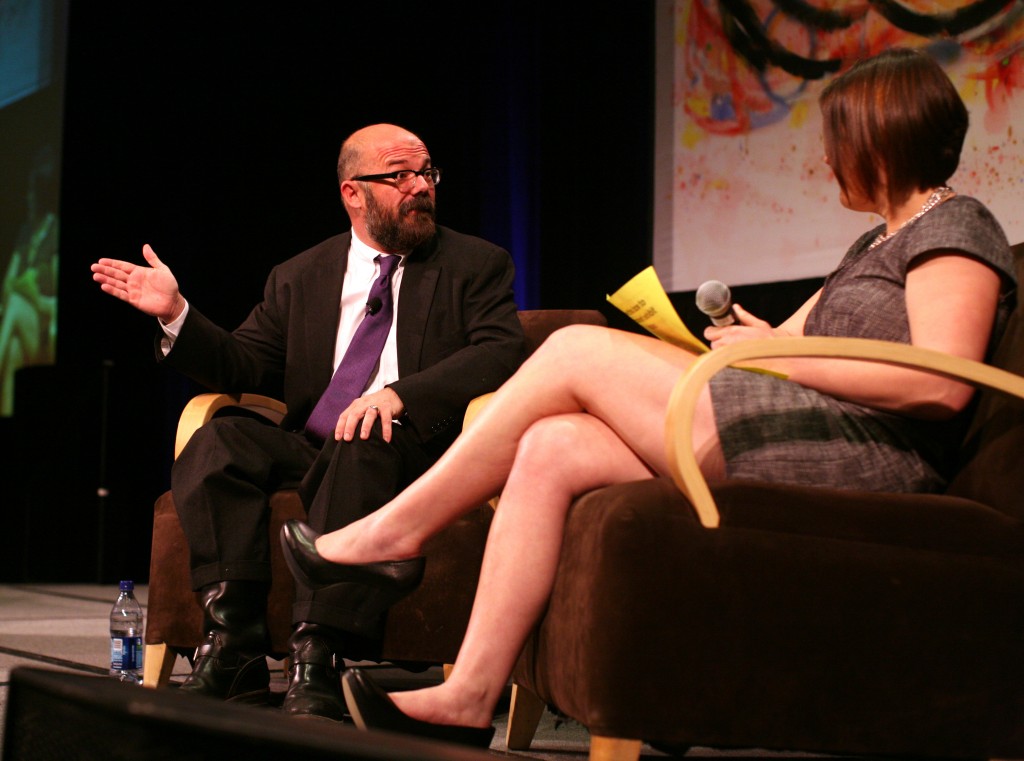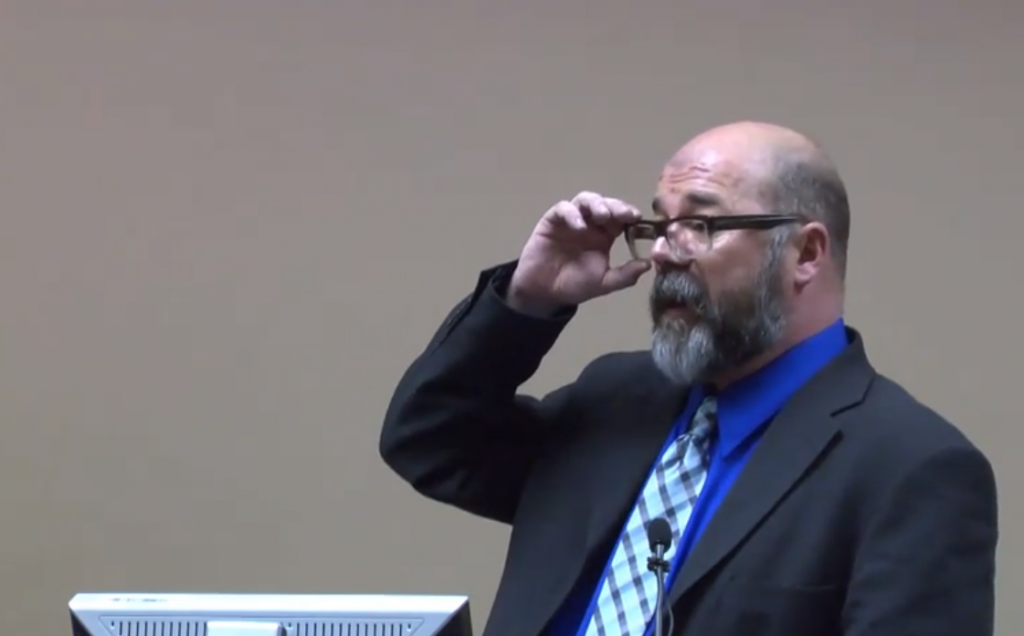How one of Israel’s most ardent supporters became a vicious detractor—and why we should have seen it coming.
The movement for same-sex marriage in the United States owes a great deal to one Englishman in particular. In 1989, when the notion of civil gay marriage was barely even considered, Andrew Sullivan wrote an essay for The New Republic entitled, “Here Comes the Groom: A (conservative) case for gay marriage.” In this landmark piece, he asserted that same-sex marriage would “foster social cohesion, emotional security, and economic prudence.” The arguments set forth in his essay became the foundation of the liberal case in favor of marriage equality and the basis of Sullivan’s work for the next twenty years or more.
His dedication to the struggle for equal marriage has earned him much well-deserved admiration, as has his pioneering role in legitimizing the blog as a form of journalism. Since he initiated the weblog The Daily Dish in 2000, Sullivan succeeded in making the practice of blogging credible while it was still in its infancy, and helped mold it into a place where serious ideas could be shared and discussed. By extension, he opened up a space for younger writers to not only blog but accumulate a certain cachet for doing so. Indeed, such is Sullivan’s online following that he has been able to disassociate himself from The Daily Beast – with whom he had a relationship from April 2011 until the end of 2012 – in order to strike it out on his own using a subscription-based model. On November 1, The Dish reported having over 30,000 subscribers which account for some $791,000 in revenue (the budget for The Dish last year at The Daily Beast was $900,000), as well as 1.2 million unique visitors and 7.7 million page-views for the month of October.
All of this is to say that, even after going behind a paywall—often a death sentence for an online publication—Sullivan remains a source of fascination for a dedicated cadre that has followed and evolved along with his own extraordinary if jarring political transformation. Over two decades or so, Sullivan has veered from the Left to Right to the Left, along the way becoming one of the most vehement supporters of Barack Obama, said to be occasionally read by the President himself.
But he has also adopted some even less reputable ideas—and not just his vocal, seemingly obsessive conspiracy theories about Sarah Palin’s child. To have monitored the Dish over the past few years is to have seen it become a forum for ceaseless Israel-bashing. On Israel, Zionism, and the issue of Palestinian statehood, Sullivan—once the most zealous of Zionists—has transformed into someone who today can barely contain his equally zealous, often irrational, contempt for Israel and her American supporters.
It is a werewolf-style mutation that has not gone unnoticed by former friends and colleagues. Sullivan has gone from “wild-eyed Zionist to vitriolic Israel-basher,” the influential journalist Jeffrey Goldberg has written, adding that Sullivan sometimes uses his blog “to disseminate calumnies that can cause hatred of Jews and of Israel.”
Leon Wieseltier, one of Sullivan’s former editors at The New Republic and an ex-personal friend of the writer, has accused Sullivan of “intellectual shabbiness” and “venomous hostility toward Israel and Jews.”
In retrospect, Sullivan’s noxious mix of hysteria and hate seems like a premonition of darker things to come.
Less commented upon, however, is the bitterness and general absence of nuance that have characterized much of Sullivan’s writing from the beginning of his career. The reckless ferocity of his ire and the rapid-fire expression of his views, quotes, and links without forethought show that blogging provides Sullivan with a convenient veil behind which he can hide—the misplaced link and the crude superficiality is in the nature of the form—and an editor-free platform that suits his angry, convulsive writing.
This is not just the case of the one feeding the other—that belligerent rhetoric and lack of curiosity can lead to shifting madly from pole to pole on Israel and the Palestinian question. Rather, it is that these deplorable characteristics manifest themselves in more insidious and troublesome ways; ways that corrupt a writer’s work and call his motives into question.
Sullivan’s undignified ferocity has manifested itself numerous times during his career. One of the ugliest came five days after the September 11 attacks, when Sullivan saw fit to turn his ire against those insufficiently aligned with his own sensibility. “The decadent Left in its enclaves on the coasts is not dead—and may well mount what amounts to a fifth column,” he wrote in the UK’s Sunday Times. The same day, Sullivan would blog about “a paralyzing, pseudo-clever, morally nihilist fifth column that will surely ramp up its hatred in the days and months ahead.” In retrospect, this noxious rhetorical mix of hysteria and hate—the stark division between good and bad and the implication of disloyalty—reads like a premonition of darker things to come.
This particular version of Andrew Sullivan, the one decrying the “fifth-column” among us, was a Sullivan greatly affected by the attacks of September 11 and strongly in favor of intervention in Afghanistan and Iraq. The trauma of 9/11 appeared to solidify not only Sullivan’s commitment to the centrality of American exceptionalism, but his support of Israel as well.
“The United States’ defense of the only democracy in the Middle East is one of the reasons that I’m proudest of the United States,” he said in a C-SPAN appearance on February 1, 2002. “I admire Israel,” he commented. “I admire the Israeli people, and I admire their tenacity to defend democracy in the face of exactly the kind of fascism that [hit] the United States.”
At the time, Sullivan believed the fates of the United States and Israel were intertwined, their experience one and the same. Israel faces, he said on November 8, 2002 (once again on C-SPAN), “the same problem that we do of terrorism, of suicide bombers, of people who are not interested whatsoever in making peace with Israel but in destroying Israel.” Hezbollah, the PLO, and other Arab states propagate a “fanatical, Hitlerian anti-Semitism,” he asserted. “These surrounding powers want Israel to be destroyed. Almost none of them even acknowledge its right to exist and are fomenting terrorism against its civilians which is exactly the same as the terrorism fomented against us.”
Taken in the context of these remarks, Sullivan’s transformation over the past decade is indeed remarkable. Fast forward to January 6, 2010 and Sullivan is “sick” of Israel—not just the government, but of the nation and its people. “I too am sick of the Israelis,” he wrote,
for their contempt for the interests of their most important ally, their continuation of brutalizing colonization of the West Bank, their shameless ethnic engineering in East Jerusalem, their pulverization of Gaza, the direct manipulation of domestic American politics by their ambassador, and on and on.
“I’m sick of having a great power like the US,” he continued, “being dictated to in the conduct of its own foreign policy by an ally that provides almost no real benefit to the US, and more and more costs.” Israel, he asserted on October 5, 2012, is an “ungrateful ally,” rather than a victim of those who, as he once put it, won’t “even acknowledge its right to exist and are fomenting terrorism against its civilians.” Worse still, he now wrote, Israel has become “a liability, undermining US foreign policy in the most important struggle we still face: Jihadist violence.” Not yet finished, Sullivan would add,
We give the Israelis everything they ask for and they give the US nothing in return. In fact, they have operated as a foe, not friend, greeting Obama with the Gaza assault, deliberately destroying Obama’s Cairo outreach to the Arab-Muslim world with their settlement policy, confirming every conspiracy theorist in the Middle East, and in a particular moment of hubris, the Israeli prime minister lectured the US president in front of the cameras in the Oval Office as to what US policy should be. My view is quite simply that Netanyahu, in alliance with neocons and Christianists, has had one main policy these past four years: getting rid of Obama so he can control Greater Israel for ever and get the US to bomb Iran for him.
The style of this rant is the same that Sullivan has always practiced; it is the enemy that has changed.
In Sullivan’s mind, Israel has gone from virtuous to irredeemable, from an object of love to an object of contempt. Disillusionment and disenchantment would be one thing; Israel, as the product of a dream, or a spectrum of dreams, will always have a slight taste of disappointment about it, whatever one’s ideology. But to veer from one extreme to the other, from blazing light to total darkness, cannot be the result of a rational evaluation of any country. Something else, something more sinister, is at work here.
The irrationality of Sullivan’s devolution shows itself in the manner of his turnaround. It has a great deal to do with context and not a lot to do with fact. When Sullivan wrote in August 2001 that, “The notion of a negotiable peace with the murdering hoodlums who run the PLO was always a fantasy,” it was in the midst of the second intifada. In June of that year, 21 Israeli teenagers were murdered when a suicide bomber exploded himself in the Dolphinarium discotheque in Tel Aviv. In August, another suicide attack on the Sbarro pizzeria in Jerusalem killed 15 civilians. This, as well as the failure of peace negotiations at Camp David in 2000 and Taba in 2001, makes Sullivan’s reaction ugly but understandable.

Sullivan frequently uses the Road Runner quote “meep meep” when he thinks Republicans have gone off the rails. Illustration: Jed Hunsaker / Picasa
But in the years since, Sullivan’s views have shifted 180 degrees while Israel’s security situation has not changed a great deal. While the looming, unpredictable danger of suicide bombings in restaurants and nightclubs has been suppressed, it has been superseded by the looming, unpredictable danger of rocket attacks, mostly from the Gaza Strip but also from Sinai, southern Lebanon, and the Syrian-controlled sector of the Golan Heights. More generally, no Arab nation has recognized Israel’s right to exist since 1994, and the Arab Spring has made an unstable and unpredictable neighborhood even less stable and predictable, especially in Egypt and Syria.
Nor have the problems that bedevil the Israeli-Palestinian peace process altered. The occupation and the settlements, for example, were a secondary concern for Sullivan in 2001. Now he sees them as “brutal colonization,” in response to which all aid to Israel should be suspended. It is true that the settlements today are larger and the settlers more numerous, but their rate of expansion has not changed since Sullivan was largely indifferent to the issue. The moral and legal status of the settlement enterprise has not changed either, which is to say, if it is illegal and immoral for Israel to construct houses and build roads in Elon Moreh today, the same was true in 2001.
Since the conditions on the ground in Israel are largely the same, it seems that something has changed in Sullivan, and not the country he now despises. To be fair, this has been true of Sullivan’s positions on a great many issues, but as in the past, these changes appear to be more emotional than intellectual. His slide from interventionism to isolationism, for example, is clearly tied to his disgust over the way in which the intervention in Iraq played out, particularly the substantial loss of American lives and the abuses at Abu Ghraib prison. In a recent appearance on CNN, Sullivan called the Iraq War “the most catastrophic disaster in American foreign policy,” cutting off Leon Wieseltier, who was advocating intervention in Syria, by saying that Wieseltier’s arguments “sound if as the Iraq War never happened.” Sullivan now appears to see all American policies in the Middle East through the prism of Iraq.
But on Israel specifically, his hatred has more to do with the 2008 election and the extent to which Sullivan became enthralled by Barack Obama and appalled by his opposition (to the point that he publicly embraced a conspiracy theory that Sarah Palin faked her last pregnancy). Sullivan’s view of Obama in regard to the Middle East was almost messianic. “President Obama is one the best things to happen to Israel in a long time,” he said in an October 6, 2011 videoblog, saying that the president had within him the potential to bring peace to Israel and Palestine and somehow succeed where all his predecessors had failed.
“As long as Netanyahu is Israel’s prime minister,” Sullivan wrote in 2012, “Israel is not our ally.”
Having found a hero, Sullivan—as he often had in the past—also found an enemy: It was Israeli Prime Minister Benjamin Netanyahu. Netanyahu, Sullivan now believed, had thwarted and undermined Obama’s efforts. “As long as Netanyahu is Israel’s prime minister,” he wrote on October 5, 2012, “Israel is not our ally.” On November 16 of the same year, Sullivan asserted that the failure of the Netanyahu government to “seize the opportunity Obama offered them four years ago—indeed to treat the United States president with contempt combined with an open attempt to elect his opponent—will haunt the Jewish state.” It seems that so long as Obama is president and Netanyahu prime minister, Sullivan will have nothing good to say about Israel and will cease defending their actions, however justifiable they may be.
Sullivan’s vitriolic rhetoric also seems to be fueled by something that his writing makes embarrassingly clear: The truth is, he doesn’t know very much about Israel.
He is, for example, very angry about the rise of religious Zionism as represented by the Bayit Yehudi (“Jewish Home”) party. But he seems to know little or nothing about the historical schisms in Israeli society—which is often intensely divided along political, religious, and ethnic lines—that have both supported and opposed that rise. Nor does he seem to grasp how these divisions contribute to the make-up of the Knesset and the workings of Israel’s political system. Most surprisingly, he seems remarkably uninterested in finding out.
Sullivan’s completely erroneous coverage of Israel’s most recent general election displayed all of these flaws in their most extreme form. In a January 18, 2013 post entitled, “Israel’s Fundamentalist Temptation,” for example, he wrote:
Next week’s Israeli election will almost certainly mean the end of even the illusion of any two-state solution ever happening—and of a secular country able to make peace with its neighbors, let alone relent in its aggressive repopulation of the occupied territories. It looks as if it will empower the fundamentalist, racist far right in ways we have not yet seen. Which is to say: If you fear a nuclear-armed theocracy emerging in the Middle East, Iran should not be your only worry. The slick and truly modern theo-fascism of a man like Naftali Bennett bears all the hallmarks of modern fundamentalism. Including its tendency toward violence when challenged.
This prediction proved to spectacularly wrong. There were indeed gains for Naftali Bennett’s Bayit Yehudi party, but the biggest story of the 2013 elections was a spectacular surge in support for Yair Lapid’s Yesh Atid (“There is a Future”) party, whose platform favored the two-state solution and an avowedly secular approach to Israeli politics and governance. Labor, Hatnua, and Meretz—all of which are secular and firmly in the peace camp—also made gains. The official policy of the government coalition that followed became, in spite of the inclusion of Jewish Home, one of negotiations with the Palestinians the outcome of which would be a division of the land and a Palestinian state. Hardly the death of the two-state solution Sullivan predicted.
What is truly bizarre, however, is that Sullivan’s views appear to have been completely unaffected by the outcome of the elections. Indeed, Sullivan continued to advance his theory that Israel must be saved from imminent theocracy. “In America, Obama has saved us by defusing the theo-authoritarians,” he wrote on January 24. “In Israel, no Obama has yet emerged since Rabin.” It is very difficult to understand what Sullivan is trying to say here. In what way is Obama like Rabin? How did Rabin “defuse theo-authoritarianism”? Rabin certainly challenged both the religious and the secular Right over the peace process, but reducing the role of religion in Israeli life and politics was never part of his agenda; certainly, Rabin was never identified with the issue. Put simply, Sullivan appears to know little or nothing about Rabin and his policies.
Sullivan’s newfound hatred of Israel is buttressed by a startling ignorance about the country and its policies.
Nor does Sullivan appear to know very much about Israel’s long term policy goals. In a May 7, 2012 post entitled, “Greater Israel and ‘Soft Ethnic Cleansing’” Sullivan claimed that Israel’s ultimate desire is a one-state solution in which the Palestinians will be expelled. “I think that’s where Israel is eventually headed: ethnic cleansing by a variety of means,” he wrote. And it got a great deal uglier. Israel, he said, had sealed “its abandonment of the Western tradition for pure tribalism—and worse.” Needless to say, such statements have a very ugly pedigree indeed.
Putting that aside for now, the post made clear that Sullivan hasn’t really been observing the Israeli political scene at all. The one-state solution is a minority view in Israel, publicly advocated by widely disliked politicians like Moshe Feiglin and other polarizing figures. Indeed, members of Otzma Le’Yisrael, which is perhaps the most extreme Right-wing party in Israel, were unceremoniously voted out of the Knesset last January.
The truth is, the two-state solution is now a mainstream, largely consensus issue in Israel. In other words, the political Left has essentially won the argument over territory and peace. Today, the Israeli center debates only the process and the contours of the final agreement. “The settlement movement failed during the first Palestinian uprising,” historian and analyst Yossi Klein Halevi said in a recent interview with Jeffrey Goldberg. “Israelis realized then the price of the occupation; that there was no such thing, as settler leaders promised, as a benign occupation. That kind of illusion went in the late 1980s.” Prime Minister Netanyahu has now endorsed a two-solution and negotiations toward that goal. Even if Sullivan does not trust the prime minister, the significance of such a move by the leader of the Likud should be obvious to any knowledgeable observer of Israeli politics.
Ignorance cannot explain everything about Sullivan’s views, however. As Leon Wieseltier titled his critical February 2010 essay on Sullivan in The New Republic, there seems, sadly, to be “Something Much Darker” at work.
Ironically, one of the most telling displays of this appeared in Sullivan’s reply to Wieseltier, under the equally ironic title “Something Much Sadder.” He slammed, “This assertion that I subscribe to some dark conspiracy theory that ‘the Jews control Washington.’”
I’m sorry but this really is a vile lie, a stark accusation of anti-Semitism, unsupported by any evidence…. I have also noted that many, many other powerful lobbies exist…. But somehow criticizing AIPAC is something forbidden for non-Jews—for fear of being labeled an anti-Semite or, if you are Jewish, a “self-hating Jew.” I refuse to be cowed by such bullying tactics.
The term “bullying tactics” is an especially telling one. It is a theme that comes up again and again in Sullivan’s writings. Put simply, Sullivan seems to believe that in criticizing Israel, AIPAC, or their Jewish-American supporters, he and others are saying something that must be but, paradoxically, cannot be said, even when it is put in shockingly ugly terms. When Maureen Dowd, for example, implied in a column last September than Dan Senor was the “puppet master” behind Paul Ryan’s foreign policy views—a claim redolent with stereotypes that can only be called appalling—Sullivan could not wait to leap to her defense.
“You are not allowed to say this in Washington without being accused of anti-Semitism,” he complained. “Let me repeat: you cannot write this. If you are a columnist and blogger, like, say, Tom Friedman or yours truly, the consequences are an immediate accusation that you are another Hitler.” Such self-pity is frankly difficult to understand when the things Sullivan claims he isn’t allowed to say or write are in fact being said and written by himself, as well as read and shared by others on a blog he owns and profits from.
It should also be noted that Sullivan’s assertion is clearly not true. Critiques and, indeed, conspiracy theories about the “Israel Lobby” have been repeated endlessly since the beginning of the second intifada, showing up on mainstream news channels, in mainstream newspapers and publications, all over the internet, and—most famously—a widely read book by two prominent professors. Claims of silencing and censorship by Sullivan and others simply do not accord with the facts.
Indeed, Sullivan himself has become one of the most diligent critics of Israel’s American supporters while remaining consistently popular and admired. The power of the Israel Lobby and the American Jewish Establishment (such shadowy organizations are always capitalized lest readers fail to understand the extent of their ostensibly enormous influence) has become a frequent subject on the Dish. Most recently, the subject came up in regard to the debate over American intervention in Syria and AIPAC’s decision to support Obama’s policy of targeted strikes on the Assad regime’s chemical weapons facilities.
Without providing any concrete evidence, Sullivan theorized that what AIPAC really wanted was to push “Obama to war against Iran,” and in so doing resurrect “a neoconservative foreign policy that will effectively undo a huge amount of the progress this president has so far managed to build.” All of this seemed inevitable to Sullivan, since voting against engagement in Syria is “something many Republicans and perhaps a few Democrats will be prepared to do. But turn down AIPAC? That’s another matter entirely.” As everyone now knows, the United States did not strike the Assad regime. AIPAC’s immense powers apparently failed on this particular occasion.
Interestingly, whenever he writes inaccurate and at times inflammatory stuff like this, Sullivan almost always appears to feel compelled to assert that he isn’t doing a thing wrong. At times, there seem to be more articles on the Dish justifying posts on the Israel Lobby than on the supposed Lobby itself. For example, in a post published on April 25, 2012 about how the NRA and AIPAC are discussed in the media and Congress, he wrote:
Yes, language describing nefarious lobbies behind the scenes pulling strings to get their way has been used in the past by anti-Semites. But if that kind of language is barred with sole respect to the Greater Israel Lobby, then the debate is effectively crippled—which is, of course, the point. For so long, the anti-Semitism card has been disgracefully, cynically played so that we can be stopped from debating the undemocratic distortion of our politics by special interest groups—in this case arguing for a foreign country’s brutal pounding of a de facto refugee camp.
Sullivan’s claims sound simply bizarre when juxtaposed with such ugly and at times hysterical rhetoric. He condemns anti-Semitic conspiracy theories, and then all but engages in one by accusing Jewish groups of undemocratically distorting American politics. In other posts, he has referred to the United States as a “slave of the expansionist Jewish state,” as if America were not by far the most powerful country in the world; referred to “the Greater Israel lobby’s grip on Congress”; and accused U.S. Ambassador to the United Nations Samantha Power of giving in to “the powers that be” when she repudiated earlier statements about Israel and the peace process. The implications of Sullivan’s claims about the extent of Jewish-American and Israeli power are, quite frankly, deeply disturbing.
There is something even more disturbing about certain things Sullivan has said that hint at far uglier beliefs. Sullivan once made a point of writing, for example, that “the Greater Israel lobby” complained about Chuck Hagel in “this familiar, exhausted, ridiculous whine.” Then there is his catalogue of posts about circumcision, which he refers to as “the barbaric practice of involuntary male genital mutilation.” To comment on where all this is coming from is best left to a former friend of Sullivan’s, who said, “Watching Andrew’s descent from steadfast defender of Israel and brave opponent of anti-Semitism into an ‘Israel Lobby’ conspiracy theorist and disseminator of anti-Semitism has been a sad spectacle.”
It is indeed a spectacle and it is indeed sad. I was reminded of just how sad when, on the day the anti-gay marriage Defense of Marriage Act was finally struck down, Sullivan took to the Dish to pen something beautiful and eloquent about the historical significance of the decision. To have same-sex marriage “recognized by the wider community,” he wrote, “protected from vengeful relatives, preserved in times of illness and death, and elevated as a responsible, adult, and equal contribution to our common good is a huge moment in human consciousness.”
I remember being told in the very early 1990s that America was far too bigoted a place to allow marriage equality—just as I was told in 2007 that America was far too bigoted a place to elect a black president. I believed neither proposition, perhaps because I love this country so much I knew it would eventually get there. I trusted the system. And it worked. From 1989 (when I wrote the first case for this on the cover of a national magazine) to today is less than a quarter century. Amazing, when you think of how long it took for humanity to even think about this deep wound in the human psyche.
As well as being poignant and true, there was something deeply tragic about this piece. It was a reminder of an Andrew Sullivan of another time and place; an Andrew Sullivan that doesn’t exist anymore. Today, we have an Andrew Sullivan who has largely given up on his intellectual integrity and forgone his greatest talents in favor of a ferociously violent hostility toward Israel. On this subject, his writing has become shabby, vapid, and shallow; his blog has become a forum for crankiness and conspiracy, a space where links to respected columnists rest alongside quotes from hate-sites like Mondoweiss and Electronic Intifada. The truth is, Sullivan’s writings on Israel are now very nearly unreadable.
It is at once disheartening, befuddling, and downright maddening. It is time that he was told: On this subject, enough.
Andrew Sullivan declined to be interviewed for this article.
![]()
Banner Photo: StuckInCustoms / flickr









